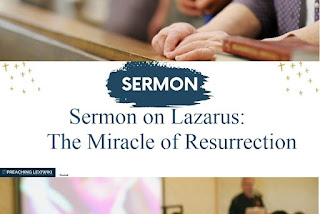Sermon on Lazarus: The Miracle of Resurrection
John 11:1-44 The death and resurrection of Lazarus, the brother of Mary and Martha, were close friends of Jesus.
One day, Mary and Martha sent a message to Jesus informing him that Lazarus was very ill. Jesus immediately spoke to his disciples, saying, "Lazarus's illness will not end in death" (John 11:1-4). Jesus remained calm, staying in place for two days after receiving the message.
-- Ads --
Against the disciples' wishes, due to concerns about attacks in the region, Jesus informed them that they were returning to Judea. He said, "Our friend Lazarus has fallen asleep, but I am going there to wake him up" (John 11:5-13).
When Jesus and his disciples arrived in Bethany, Lazarus had already been dead for four days. Both Mary and Martha expressed sorrow to Jesus. They wished he had arrived earlier, four days earlier to be precise, so that Lazarus wouldn't have died at all. Jesus told Martha, "Your brother will rise again."
She thought he meant that Lazarus would rise along with everyone else in the last days. But that's not what Jesus meant. He asked Mary, "Where have you laid him?" After showing Jesus the tomb where Lazarus lay, Jesus said, "Take away the stone!" Martha, not anticipating a great miracle, said, "Lord, by this time there will be an odor, for he has been dead four days." Jesus replied, "Did I not tell you that if you believed, you would see the glory of God?" The stone was removed.
Jesus looked up to heaven and prayed, "Father, I thank you that you have heard me. I knew that you always hear me, but I said this for the benefit of the people standing here, that they may believe that you sent me." A hush fell over the crowd.
Anticipation gripped everyone witnessing the prayer. What was Jesus going to do? Jesus cried out, "Lazarus, come out!" Lazarus appeared at the entrance of the tomb, presumably having jumped to the entrance completely wrapped in burial cloths. Everyone was in shock and disbelief. A surreal moment enveloped everyone in the crowd. "Who is this man who can raise the dead?" Jesus gave one final command: "Unbind him, and let him go!" Lazarus was freed from the bonds of death.
I. The Sick Lazarus: John 11:1-3
Our journey begins with the introduction of Lazarus, a beloved friend of Jesus, who falls gravely ill (John 11:1-3). This sets the stage for a sequence of events that will unfold, revealing the divine purpose behind the apparent tragedy.
II. The Message to Jesus: John 11:3-4
In John 11:3-4, the urgency of the situation prompts Lazarus's sisters, Mary and Martha, to send a message to Jesus, informing Him of their brother's sickness. Their actions exemplify the natural response of turning to Jesus in times of distress.
III. Jesus’ Delay: John 11:5-7
Despite receiving the news of Lazarus's sickness, Jesus deliberately delays His arrival (John 11:5-7). This delay sparks questions and uncertainty, setting the stage for a more profound revelation of His power.
IV. The Death of Lazarus: John 11:11-14
Tragically, Lazarus succumbs to death before Jesus arrives (John 11:11-14). The unfolding events create an atmosphere of sorrow and grief, intensifying the need for a miracle that transcends human understanding.
-- Ads --
V. Martha’s Trust in Jesus: John 11:21-22
Martha, upon meeting Jesus, expresses her trust in His ability to bring about change, even in the face of death (John 11:21-22). Her words pave the way for the revelation of Jesus as the Resurrection and the Life.
VI. The Promise of Resurrection: John 11:23-27
In response to Martha's trust, Jesus declares a profound truth in John 11:23-27—a promise of resurrection and eternal life for those who believe in Him. This statement lays the foundation for the miraculous events that will unfold.
VII. The Weeping of Jesus: John 11:32-35
As Jesus witnesses the grief and sorrow of those around Him, He is deeply moved and weeps (John 11:32-35). His compassion and empathy demonstrate the very heart of God in the face of human suffering.
VIII. The Miracle of Resurrection: John 11:43-44
The climactic moment arrives when Jesus commands Lazarus to come forth from the tomb (John 11:43-44). The once-dead man emerges, bound in burial cloths, showcasing the unparalleled power of the Savior over death.
IX. The Witnesses' Reaction: John 11:45-46
The witnesses to this astonishing miracle respond with a mixture of awe, amazement, and belief (John 11:45-46). The resurrection of Lazarus becomes a compelling testimony to the divinity of Jesus.
X. Counsel for Believing in Jesus: John 11:25-26
Jesus concludes this miraculous episode with words of counsel in John 11:25-26, urging all to believe in Him, the Resurrection and the Life. The narrative of Lazarus serves as an invitation to trust in Jesus, who holds power over life and death.
- Sermon on Ecclesiastes 3: Time and Life with God
- Sermon on Altars: Rebuilding the Altar of God
- Sermon on Acts 2: The Outpouring of the Spirit at Pentecost
Conclusion:
As we reflect on the miracle of Lazarus' resurrection, let us be reminded of the profound truth that Jesus is the source of life and victory over death. In the face of our own challenges, sorrows, and even the specter of death, may we turn to the One who not only wept with us but conquered death for us. The resurrection of Lazarus foreshadows the ultimate triumph of Jesus over the grave, and it beckons us to place our trust in Him. Let this miraculous account inspire a deepened faith, a steadfast hope, and an unwavering belief in the Resurrection and the Life—Jesus Christ, our Lord. May His miraculous power be evident in our lives, bringing forth resurrection and new life in every area.

